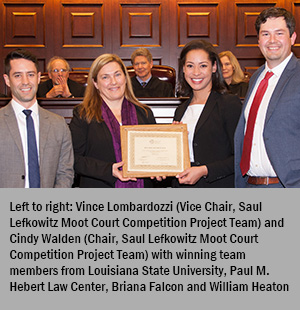Saul Lefkowitz Competition Celebrates 28th Annual National Finals Winners
Published: April 15, 2019
 The Saul Lefkowitz Moot Court Competition concluded another successful year-its 28th-at the National Finals on March 16, at the U.S. Court of Appeals for the Federal Circuit in Washington, D.C., USA.
The Saul Lefkowitz Moot Court Competition concluded another successful year-its 28th-at the National Finals on March 16, at the U.S. Court of Appeals for the Federal Circuit in Washington, D.C., USA.
Nationwide, 73 teams from 56 law schools from across the United States participated in this year’s competition. The following 12 teams advanced to the National Finals:
Atlanta Region
University of Louisville Brandeis School of Law
University of North Carolina School of Law
Chicago Region
DePaul University College of Law
University of Wisconsin School of Law
Dallas Region
Louisiana State University, Paul M. Hebert Law Center
University of Oklahoma College of Law
Los Angeles Region
Chapman University Dale E. Fowler School of Law
Pepperdine University School of Law
New York Region
American University Washington College of Law
Drexel University Thomas R. Kline School of Law
San Francisco Region
Golden Gate University School of Law
Gonzaga School of Law
This year’s fictional problem examined issues relating to residual trademark rights in the augmented reality context, and potential infringement arising from nostalgic use of a
The problem centered around Skeletron Animation Productions, LLC and its founder Lucifer L. Lyons (collectively known as “SAP”), developers of the “Skeletron” fantasy character, a dark sorcerer that appeared in video games, movies, magazines, and on billboards throughout the United States in the 1980s. In 2018, SAP sued Cyber Skull Security, Inc. for trademark dilution and false designation of origin arising from Cyber Skull’s use of the SKELETRON character and brand name in advertisements and as a useable character within Cyber Skull’s augmented reality cybersecurity program. Specifically, SAP argued that Cyber Skull’s use of the SKELETRON character and brand name would dilute the fame of its SKELETRON character and trademark, and would cause consumers to falsely associate the two companies.
 Cyber Skull denied the accusations, arguing that the Skeletron character was no longer famous, that Skeletron Productions had abandoned any trademark rights, and that, in any event, its software was protected expression under the First Amendment. Resolving these arguments, the District Court of Utopia found that SAP did not abandon its trademark rights in the SKELETRON character and trademark. However, it also found that the SKELETRON mark and character were no longer
Cyber Skull denied the accusations, arguing that the Skeletron character was no longer famous, that Skeletron Productions had abandoned any trademark rights, and that, in any event, its software was protected expression under the First Amendment. Resolving these arguments, the District Court of Utopia found that SAP did not abandon its trademark rights in the SKELETRON character and trademark. However, it also found that the SKELETRON mark and character were no longer
At the National Finals, the students argued these issues before Trademark Trial and Appeal Board (TTAB) judges, including Chief Judge Gerard Rogers, as well as TTAB interlocutory attorneys, all of whom subjected the student advocates
Ultimately, the following teams were named National Finals winners:
- Winning Team: Louisiana State University, Paul M. Hebert Law Center (Briana Falcon and William Heaton)
- Second Place Team: Golden Gate University School of Law (Katie Christensen, Kyndal Currie, Amy Saechao, and
Gianne Carlo Nalangan) - Dolores K. Hanna Best Brief Award: Golden Gate University School of Law (Katie Christensen, Kyndal Currie, Amy Saechao, and
Gianne Carlo Nalangan) - Second Place Brief: Louisiana State University, Paul M. Hebert Law Center (Brittany Kaplan and Evan Kline-Wedeen)
- Best Oral Argument: Louisiana State University, Paul M. Hebert Law Center (Briana Falcon and William Heaton)
- Second Place Oral Argument Team: American University Washington College of Law (Kathryn Smucker, Lauren Mattioni, and Elliot LeParne)
At the awards ceremony, 2019 Saul Lefkowitz Project Team Chair Cynthia Walden (Fish & Richardson P.C., USA) thanked the oral argument judges and other
The sponsor of the national finals, Chris Foley (Finnegan, Henderson, Farabow, Garrett & Dunner LLP, USA) then provided personal commentary on Saul Lefkowitz and praised students for the high quality of their legal arguments. Finally, Ms. Walden announced the winning teams. The competition concluded with a vibrant reception and celebration at the Washington, D.C., offices of the Finnegan law firm, a longtime sponsor of the National Finals.
For the 2019-2020 year, Vincent Lombardozzi (Vorys, Sater, Seymour & Pease, LLP, USA) will serve as Chair of the Saul Lefkowitz Project Team. Alisa Simmons (Fitch, Even, Tabin & Flannery LLP, USA) will serve as Vice Chair.
The Saul Lefkowitz Competition provides a valuable opportunity for students to hone their skills. Many past participants have gone on to successful careers with INTA-member organizations, as well as leadership positions within the Association itself.
The Saul Lefkowitz Project Team would like to thank all of the many volunteers who participated in this year’s competition and helped to make the event a success.
Academic Programming at INTA’s 2019 Annual Meeting
INTA’s 2019 Annual Meeting, held in Boston, Massachusetts, USA, May 18-22, features a number of educational sessions for professors and law students. This includes an Adjunct Professor panel on Trademarks in Law School Curriculum, where experienced educators will discuss strategies for achieving law school goals for trademark fluency in new attorneys. Get the details and register here.
Although every effort has been made to verify the accuracy of items in the INTA Bulletin, readers are urged to check independently on matters of specific concern or interest.
© 2019 International Trademark Association